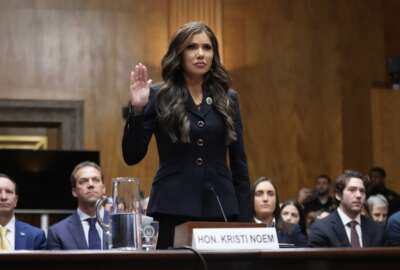Here’s one thing the Biden administration will want to do in its remaining months
The Biden administration has a few things to get done in the time left — among them, regulations on government contractors.
President Biden may not be running for re-election anymore, but the administration has a few things to get done in the time left — among them, regulations on government contractors. Joining the Federal Drive with Tom Temin with his prediction is federal sales and marketing consultant Larry Allen.
Interview transcript:
Tom Temin President Biden may not be running for reelection anymore, but the administration has a few things to get done in the time left — among them, regulations on government contractors. Here with his prediction, federal sales and marketing consultant, Larry Allen. And you are of the opinion that there is a big regulatory wave yet to come, before the election and before the end of this particular administration?
Larry Allen Tom, I really think that there is. I think we can expect to see regulatory activity, obviously, not just in government contracting, but make no mistake, government contracting will be part of this between now and inauguration day in January. We’ve seen this before happen at the end of some two term presidencies, where we see an administration that wants to get its agenda done quickly and thoroughly as possible. I think with the election most likely coming down to election day, and maybe even a few days after that itself, this administration is not going to take any chances in getting some of its high end regulatory wish list out the door and enacted. For government contracting, I think that we’re going to see a lot of socioeconomic things, as well as issues that have to do with strengthening labor.
Tom Temin Tell us more, what are some of the details? It’s still pending, because there has been a lot of that already.
Larry Allen Well, I think what we’re going to expect to see is we’ve got a sustainability rule, Tom, sustainable procurement that’s kind of been held in limbo. And there’s some big reasons for that, because it transcends government procurement, obviously, in the administration’s overall environmental agenda. But I think we can expect to see that sustainability rule go. The sister rule to that is on greenhouse gas issues, and people are saying, well, we already have greenhouse gas rules in the FAR. Well, this would put that on steroids by requiring not just reporting but mitigation strategies, if you did enough business with the government to warrant that type of activity, so it’d be much more intrusive. In the labor area, I wouldn’t be a bit surprised to see the administration try to bring back up our old friend, the contractor blacklisting rule. Like at the beginning of this administration, we already saw the Department of Agriculture try to do that. I think, and my colleagues think, that that was kind of a trial balloon that was immediately shut down. But you never know, when you’ve got an administration that’s coming out with some pretty bold policy initiatives, things like revamping the Supreme Court. I don’t think this is a time where government contractors can look away what could happen to the rules that govern their contracts.
Tom Temin And all rules have to go through the Office of Information and Regulatory Affairs, which is part of the White House. And since these have been bouncing around for some time, is it fair to say that a wire has probably already evaluated them, and therefore that would not be much of an impediment at this point for their becoming final?
Larry Allen I think that’s exactly right, Tom. I think what we can expect to see out of this Office of Information Regulatory Affairs, is a fast track for any high priority administration issues. We already had the associate administrator from OIRA in an interview that you all did recently, talking about how laser focused he is on making sure that they have strong rules to move forward with the administration’s priorities. You know, my experience, OIRA is place where rules can go to die if the administration is ambivalent about them. But they can also go be the office that green lights a lot of things that might not otherwise get it.
Tom Temin And that was my interview with Samuel Berger. We’re speaking with Larry Allen, president of Allen Federal Business Partners. And you’re also talking this week about a contractor and government officials who keep making a common mistake, which is getting into conflict of interest situations in leaving government, going to industry and helping the company they work for get contracts at their old agency.
Larry Allen Tom, generally speaking, I think any time I can interject a little Britney Spears into the government procurement, we’re in for a treat. And, so, this comes under the heading of “oops, they did it again,” borrowing a little bit from Ms. Spears. And what we’re talking about is what you would think people would know better by now, the time worn path of a government official who either seeks or is open to post employment offers from a contractor at the same time as they are involved in a specific procurement. And there are two actions that I’m writing about this week. And one of the ironies is that there’s no real dollar amount that delineates these activities, Tom. And one of the examples that I give this week is a large, multi-million dollar acquisition that wraps up the Army CIO and large government contractor and you would think, oh, you know, the company, you know, they shouldn’t do that but you can see what the temptation would be. But the other one that I’m talking about is a Navy admiral and a small government contractor that really doesn’t do a lot of government business, or the total amount of business is actually under $500,000. So, you’ve got to think, really is the juice worth the squeeze for sending out your reputation, in this case is a four star Admiral, for a penny-ante procurement? Well, we’re about to find out because although those cases haven’t been officially adjudicated, yet, it’s not looking good right now, what we do know, Tom.
Tom Temin Right. So, then, kind of the age old advice, check with your ethics officer before you leave the government and understand the ground rules when you join a company. And don’t make promises to that company that you can necessarily, or at all, get business with the agency you just left.
Larry Allen Right. There is a process for this. And, look, even I’ve been through this process, Tom, when I ran the Coalition for Government Procurement. If you’re interested in talking to a federal acquisition or federal official, on some level, about employing them after they leave government, that person should recuse themselves in writing to their ethics officials and say, look, this is what we’re doing. This is how long I anticipated going for. And during the duration that we’re having these discussions, I’m recusing myself from anything to do with this company. And at the end of that time, wherever we came out at the end, they were they were able to un-recuse themselves, if that’s a word. And contractors need to know that, too. Certainly, government people are trained on this all the time. But it takes two to tango, as they say. And contractors can’t be ignorant about these requirements as well. You can’t assume that your government person that you’re talking to has done the clearance unless you’ve seen them do the clearance.
Tom Temin What’s that old saying? If the pitcher hits the stone, or the stone hits the pitcher. Either way, it’s the pitcher that’s going to get the worst of it.
Larry Allen And I think that’s the takeaway for government contractors being, as they are, the lowest rung of the acquisition ladder.
Tom Temin All right. Larry Allen is president of Allen Federal Business Partners. As always, thanks so much.
Larry Allen Tom, thank you, and I wish your listeners happy selling.
Tom Temin We’ll post this interview at federalnewsnetwork.com/federaldrive. Subscribe to the Federal Drive wherever you get your podcasts.
Copyright © 2025 Federal News Network. All rights reserved. This website is not intended for users located within the European Economic Area.
Tom Temin is host of the Federal Drive and has been providing insight on federal technology and management issues for more than 30 years.
Follow @tteminWFED






